APPENDIX II
Extracts from Giovanni Bisignani’s State of the Industry speeches, 2003-11
2003 59th AGM, Washington D.C
Summary: A new, balanced approach to aviation; building a framework relevant to the reality of the day and ready for tomorrow’s challenges; modernizing the three pillars of stagnation—bilateral agreements, ownership and competition.
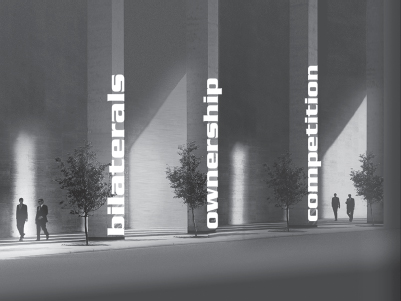
The three pillars of stagnation. Source: IATA.
Crisis is the only way to describe the state of our industry today. IATA members lost $3.8 billion on their international services in 2002. That makes over $14 billion dollars in two years. And when we include domestic losses, globally the industry lost almost $25 billion in 2001 and 2002.
Our industry has been hit by the Four Horsemen of the Apocalypse. The successive impact of September 11, a world economic slowdown, Iraq and SARS has been devastating. Our industry was like the boxer who gets hit harder after every knockdown! But under tremendous pressure, our industry has also shown the ability to change. And change dramatically.
The challenges are many. To address them we need speed, passion, commitment, knowledge and leadership. IATA, as the voice of our industry, must communicate strongly and effectively. I also see IATA as an agent of change. Because change is what our industry needs the most.
2004 60th AGM, Singapore
Summary: Remaining vigilant on costs and collectively supporting the drive for change; not stopping until the last barrier to change disappears; getting governments to demonstrate leadership for the future, not defence of the status quo.
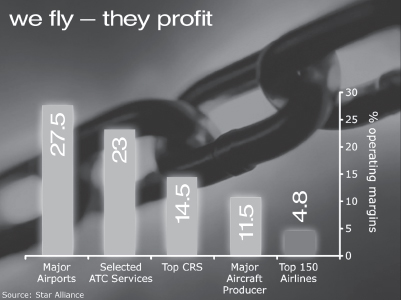
Some challenges—like the high price of fuel—are universal. Our projections of a $3-billion dollar profit this year were based on an average oil price of $30. If oil prices average $33, we break even. At $36 we could expect $3-billion losses.
Your association has been at your side, fighting the many fires that have affected the industry. Last year we achieved $63-million cost savings from airports and air navigation service providers. This year, airports from Vienna to Seoul reduced or rolled-back increases in user charges. We shouted in a polite way when Toronto gave our industry a Versailles with boarding bridges.
The industry will not pay for extravagance. I will continue to be a thorn in the side of partners who do not understand our needs. Our protests eliminated cross-subsidy in privatization plans for Narita. In Hong Kong, IATA engaged the government to ensure that economic regulation was included in airport privatization plans.
The message must be clear: air transport is the economic lifeblood of a community. Governments must stop milking the industry to solve their inefficiencies or a city’s budget problems.
We are taking the European Union to court to fight misguided regulations concerning compensation for flight cancellations and delays. They wanted to make airlines take responsibility for snow! It is high time that European Union regulators took the trouble to learn about the industry they are busy mis-regulating. Our achievements helped the industry survive three very difficult years. Now, we must move from fighting fires to designing new industry structures.
Consumers pay for value, not for complexity. The traditional model is being pressured in all corners of the globe. The challenge is to retain the value of the network system but eliminate the costs of complexity. Our future structure is a low-cost industry, with some airlines offering network services at a premium the consumer is willing to pay for. We must shift our agenda from fire-fighting to building a new industry structure. The key new design element is Simplifying the Business. To move forward, we need strong leadership and a vision of change that is shared by all stakeholders.
2005 61st AGM, Tokyo
Summary: A five-point agenda for change:
• Governments must stop treating us like cash cows.
• Governments must ensure that monopoly providers get serious about cost efficiency.
• Governments must stop distorting competition.
• Governments must stop micro-managing the industry.
• Give us the freedom to run our business like any other business.
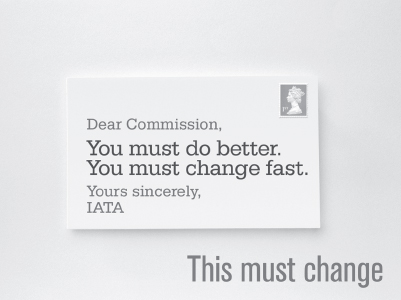
Source: IATA
My concern is the bottom line. Losses between 2001 and 2004 exceeded $36 billion. And we will lose another $6 billion in 2005. Parts of the industry are profitable. But the margins are not acceptable for a $400-billion industry. Urgent action and change are needed.
Your association is changing as well. Some 60% of our team is new. And we are 14% leaner. We have new expertise and a new culture. Your priorities are now our top priorities. Our obsession with efficiency has driven costs down. Cost-cutting allowed us to return $6 million to airlines in our settlement systems. We are investing $11 million in industry projects like safety and Simplifying the Business alone. This is $17 million. This is more than we collect in dues.
More importantly, this year we expect to save the industry at least $1 billion in taxes, charges and fees; and $700 million in route improvements.
We have one great advantage. We have a clear vision and we are passionate about our future. A future as
• A low cost, environmentally responsible industry
• that safely and securely connects the globe
• provides value to passengers and shippers
• and supports global economic development.
2006 62nd AGM, Paris
Summary: Sending out wake-up calls; airlines must keep focused on efficiency; unions must understand that to share in success means being part of the solution; Global Distribution Systems must deliver value for money; fuel suppliers must realize that profiting without investing is not acceptable; airports must appreciate that efficiency is coming; and governments must not kill us with an overdose of taxation.
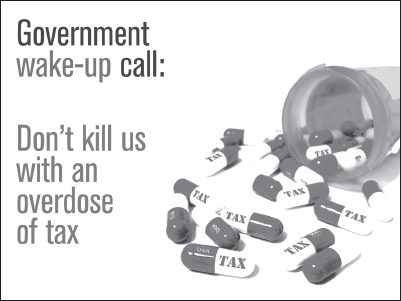
Source: IATA
We are starting to see light at the end of a five-year tunnel—some cautious optimism.
Since 2001 labour productivity improved 33%, sales and distribution costs dropped by 10%, and overall non-fuel unit costs reduced by 13%. Airline efforts have moved the break-even fuel price from $14 per barrel to $50. We are en-route to a low-cost industry. We have not yet landed—but the approach is near.
Facts and figures highlight our responsible approach to our most important issues. But too often stakeholders, who lack the vision and speed to match our achievements, block our progress.
Our customers should be angry. Your choice is restricted by an outdated bilateral system. Your cheap tickets are expensive because politicians add taxes. Your time is wasted because governments cannot organize direct, environmentally friendly routes. Your money subsidizes airport inefficiency because governments have failed to regulate monopolies. And you wait too long for shipments to arrive because governments are not living in the Internet world.
2007 63rd AGM, Vancouver
Summary: Air transport must become an industry that does not pollute; the potential building blocks for a carbon-free future are already in place.
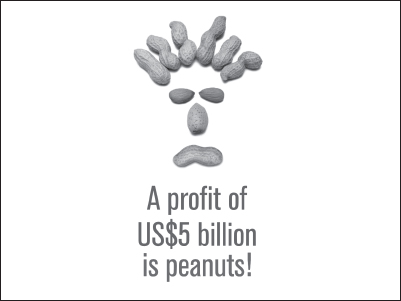
Source: IATA
We are now a $470-billion industry and a profit of $5 billion is peanuts. We need $40 billion just to cover the cost of capital. We are moving in the right direction but the financial hole is deep. The industry is $200 billion in debt. Our financial foundation is weak.
Another challenge is coming into view, the environment. Our track record is good, reducing noise 75% and improving fuel efficiency 70%. The billions being invested in new aircraft will make airlines a further 25% more fuel-efficient by 2020. So even as demand for travel increases, the increase in our carbon footprint will be limited. The UN estimates that we will grow from 2% of total carbon emissions to just 3% by 2050.
But we have been silent in our success and now we have a reputation crisis. That makes us an easy target for politicians who think green and see cash. Despite a good track record and a strong policy, we have been weak communicators. So we are working with you and our industry partners to raise the volume of our communications. But this is only part of the solution.
Our carbon footprint is growing and that is not politically acceptable— for any industry. Climate change will limit our future until we change our approach from technical to strategic. Strategy starts with vision: for Toyota, it’s an Earth Charter, GE has ecomagination and BP has Beyond Petroleum. So what is our vision?
Let me start the debate by aiming high. Air transport must become an industry that does not pollute. Zero emissions. I don’t have all the answers but our industry started with a vision that we could fly. The Wright Brothers turned that dream into reality and look at where we are now. We can see potential building blocks for a carbon-free future.
2008 64th AGM, Istanbul
Summary: Giving every airline the commercial tools to manage crises effectively and the opportunity to compete globally on a level playing field; urgent action is needed to communicate clearly to governments the dimension of the crisis, the potential impact on the global industry if our industry fails, the measures airlines are taking and the action that they must take; an Agenda for Freedom Summit will help to drive much bigger change that will free airlines from national flags, secure financial stability and create global opportunities.
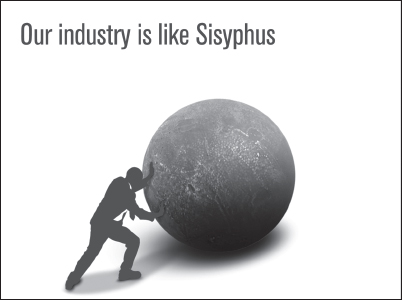
Source: IATA
Our industry is like Sisyphus. After a long uphill journey, a giant boulder of bad news is driving us back down.
It’s another perfect storm. The spreading impact of the US credit crunch is slowing traffic growth. At best we expect 3.9% this year. After enormous efficiency gains since 2001 there is no fat left and skyrocketing oil prices are changing everything. For every dollar the price of oil goes up, costs go up by $1.6 billion. If oil stays at $135 for the rest of the year, losses will be $6.1 billion. The situation is desperate and potentially more destructive than our recent battles with all the Horsemen of the Apocalypse combined.
The crisis is also a catalyst for governments to deliver results on the environment that reduce fuel burn. Even before the fuel crisis our vision to address climate change set the benchmark for all industries—carbonneutral growth, leading to a carbon-free future. IATA’s Four Pillar strategy is driving progress to deliver real reductions in CO2, by investing in technology, flying planes effectively, building efficient infrastructure and implementing positive economic measures. Our attention to the environment also includes the little things. This is our first carbonneutral AGM.
Crises are opportunities to drive bold changes. Four years ago in the wake of a crisis we had a vision to modernize our business with technology, improve convenience and save $6.5 billion. Today that vision is a reality. The star of the show is e-ticketing. Together we made 100% e-ticketing a reality. Congratulations. Thanks to all of you, a great industry team, and for a great industry effort. Working together we achieved enormous change.
2009 65th AGM, Kuala Lumpur
Summary: The biggest job is resizing and reshaping the relationship with governments; climate change is a priority but moving from punitive taxation to joint problem-solving is also vital.
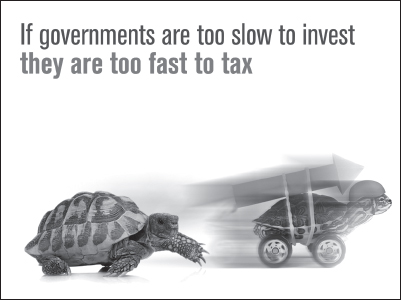
Source: IATA
How long must we travel the desert of global recession? There is no modern precedent for today’s economic meltdown. Cargo remains a good leading indicator. Its 23% freefall in December was a clear sign that the global economy was collapsing. It has been stable at that level for five months.
This may be the bottom but recovery is different. Banks are still not able to finance business. $1 trillion is still needed to re-capitalize. Our customers don’t have confidence. They need to reduce debt and that means less cash to spend. Business habits are changing and corporate travel budgets have been slashed. Video conferencing is now a stronger competitor.
Our relationship with governments must move from punitive microregulation to joint problem-solving. Governments must understand that we can help them protect their citizens, improve efficiency, save jobs and support economic growth, but only if we work together.
Let me be clear. We don’t want bailouts. All we want is access to global capital, but old rules stand in the way of a healthier industry. If we cannot pay the bills, saving the flag on the tail will not save jobs. A prolonged recession could lead to a cash crisis. This would put at risk 32 million jobs and the lifeblood of the global economy.
2010 66th AGM, Berlin
Summary: The industry needs to have a vision for the future; how can it get to $100 billion in profits on revenues of $1 trillion?
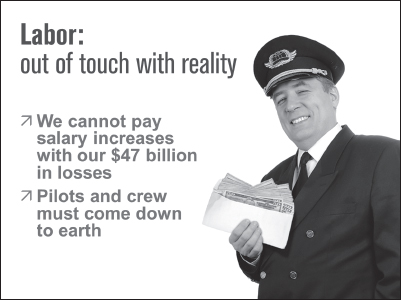
Source: IATA
The last decade tells us that this industry is capable of enormous change. We cut the accident rate by more than one-third. We survived the spike in oil prices to $144 a barrel. We improved labour productivity by 63%. Alliances grew from infancy to 56% of traffic. We developed Asia-Pacific into our largest market, one-third of all aviation. We found a global solution on noise and we are now focusing on carbon emissions. Your association worked with you to drive change with speed. Since 2004, we saved 70 million metric tons of CO2. In 48 months, we delivered e-ticketing 100% in every corner of the planet. Working together over the last six years with programs led by your association, we saved the industry over $47 billion. The progress of our industry through your hard work has been amazing.
But today’s industry structure will not deliver the profits we need. In a decade when airlines lost $5 billion a year, 574 airlines started operations and less than 200 disappeared. Barriers to exit are too high and barriers to entry are low. With 1,061 airlines, we are the world’s most fragmented industry. Even with the recent round of mergers, the top 20 carriers only account for half the global industry. Efficiency gains never make it to the bottom line because we are deprived of the commercial freedom to operate like a normal business. And poor profitability makes every shock a fight for survival. The restrictions of the bilateral system are a dam that holds us back. It’s time for that dam to burst.
I see a future where governments act responsibly, ensuring safety, security and a level playing field. A future where airlines can build efficiencies across borders to better serve their customers, and achieve sustainable profits to fund growth and innovation.
2011 67th AGM, Singapore
Summary: Airlines spent a decade in survival but IATA supported every airline, big and small; it is important to maintain the momentum for change and Vision 2050 will provide a framework.
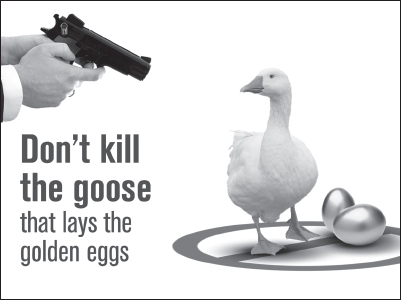
Source: IATA
Terrorism, wars and revolutions. Pandemic fears, earthquakes and volcanoes. Failing economies and skyrocketing fuel prices. Over the last decade we have seen everything. Everything, except sustainable profits.
Airlines spent a decade in survival mode. Change was harsh. Hundreds of thousands of jobs disappeared, and we said goodbye to many famous companies—Swissair, Varig, Ansett, Sabena, Mexicana and Aloha.
In the aftermath of 9/11, IATA took on the role of fireman, responding to emergencies. IATA led with speed, passion and commitment. We started with monopoly suppliers. Living in a different reality, they offset declining demand by increasing prices. Shouting politely, we instilled a new mindset that saved airlines $17 billion in costs for airports, air navigation service providers and fuel suppliers.
IATA’s role quickly changed to architect, because the industry needed a radical redesign.
IATA had to support all its members, not just the club of the powerful. Every airline—big and small—had to share the benefits. To succeed, we set targets. This was unthinkable for an association, but IATA provided support and you delivered.
Innovation and openness to change will determine our future. The changes of the last decade prove that we are capable. Airlines, governments and even your association will be challenged to adapt to new business and demographic realities. We need to keep this momentum, to drive change everywhere, not as a response to crisis, but as a way of doing daily business.
The challenge for my successor is to increase relevance by driving even more change; to keep the industry united, bridging differences and building on our many great successes; and to keep IATA focused as a global association that represents, leads and serves all of its members equally.
My confidence in the future reflects the great people who manage and lead our industry. Let me thank the ICAO leadership for solid partners; my four predecessors who built IATA’s foundations; my great IATA team who supported me on this wonderful journey; and finally the Board, our member airlines and those partners and governments which embraced change.
Thank you for trusting my leadership and supporting my many crazy ideas.
